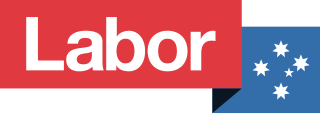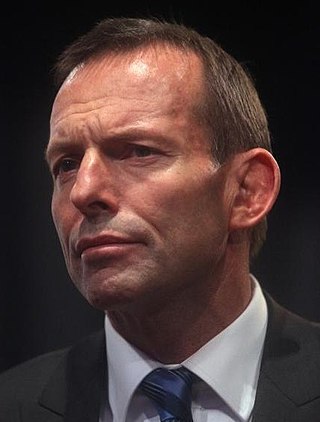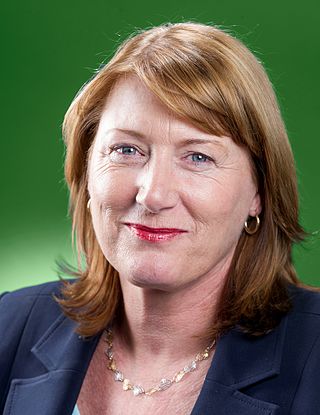Related Research Articles

The Australian Labor Party (ALP), also commonly known as the Labor Party or simply Labor, is the major centre-left political party in Australia and one of two major parties in Australian politics, along with the centre-right Liberal Party of Australia. The party has been in government since being elected at the 2022 federal election, and with political branches in each state and territory, they currently form government in New South Wales, Queensland, South Australia, Victoria, Western Australia, the Australian Capital Territory, and the Northern Territory. As of 2023, Tasmania is the only state or territory where Labor forms the opposition. It is the oldest continuous political party in Australian history, being established on 8 May 1901 at Parliament House, Melbourne, the meeting place of the first federal Parliament.

Joan Elizabeth Kirner was an Australian politician who was the 42nd Premier of Victoria, serving from 1990 to 1992. A Labor Party member of the Parliament of Victoria from 1982 to 1994, she was a member of the Legislative Council before later winning a seat in the Legislative Assembly. Kirner was a minister and briefly deputy premier in the government of John Cain Jr., and succeeded him as premier following his resignation. She was Australia's third female head of government and second female premier, Victoria's first, and held the position until her party was defeated in a landslide at the 1992 state election.
The Labor Left, also known as the Progressive Left or Socialist Left, is a political faction of the Australian Labor Party (ALP). It competes with the more economically liberal Labor Right faction.

EMILYs List is an American political action committee (PAC) that aims to help elect Democratic female candidates in favor of abortion rights to office. It was founded by Ellen Malcolm in 1985. The group's name is an acronym for "Early Money Is Like Yeast". Malcolm commented that "it makes the dough rise". The saying refers to a convention of political fundraising: receiving many donations early in a race helps attract subsequent donors. EMILYs List bundles contributions to the campaigns of Democratic women in favor of abortion rights running in targeted races.

Julia Eileen Gillard is an Australian former politician who served as the 27th prime minister of Australia from 2010 to 2013. She held office as leader of the Australian Labor Party (ALP), having previously served as the 13th deputy prime minister of Australia from 2007 to 2010, under Prime Minister Kevin Rudd. She is the first and only woman to hold either office in Australian history.

Catherine Fiona King is an Australian politician serving as the Minister for Infrastructure, Transport, Regional Development and Local Government since 2022 and as the Member of Parliament (MP) for Ballarat since 2001. She is a member of the Australian Labor Party (ALP) and briefly served as a minister in the Gillard and Rudd governments in 2013. She served as Shadow Minister of Health from 2013 to 2019 and as Shadow Minister for Infrastructure, Transport and Regional Development from 2019 to 2022.

Lynette Fay Allison is an Australian politician. She was a member of the Australian Senate from 1996 to 2008, representing the state of Victoria. As of October 2019 she is the national president of the Australian Democrats.

Christopher Eyles Guy Bowen is an Australian politician who has been Minister for Climate Change and Energy in the Albanese government since June 2022. He is a member of the Australian Labor Party (ALP) and was first elected to parliament at the 2004 federal election. He held ministerial office in the Rudd and Gillard governments from 2007 to 2013.

Candy Celeste Broad is an Australian politician. She has been a Labor Party member of the Victorian Legislative Council from September 1999 to May 2014, first representing the electorate of Melbourne North Province until 2006, and then as a Member for the Northern Victoria region.

Susan Maree Ryan was an Australian politician and public servant. She was a member of the Australian Labor Party (ALP) and held ministerial office in the Hawke government as Minister Assisting the Prime Minister for the Status of Women (1983–1988), Minister for Education and Youth Affairs (1983–1984), Minister for Education (1984–1987) and Special Minister of State (1987–1988). She was the first woman from the ALP to serve in cabinet and was notably involved in the creation of the Sex Discrimination Act 1984 and the Affirmative Action Act 1986. Ryan served as a senator for the Australian Capital Territory from 1975 to 1987. After leaving politics she served as the Age Discrimination Commissioner from 2011 to 2016, within the Australian Human Rights Commission.

Mark Alfred Dreyfus is an Australian politician and lawyer who has been attorney-general of Australia and cabinet secretary since June 2022, having held both roles previously in 2013 and from 2010 to 2013 respectively. Dreyfus is a member of the Australian Labor Party (ALP), and has been the MP for Isaacs since the 2007 election.

Gary Gray, Australian former politician and Australia's Ambassador to Ireland, was the Australian Labor Party (ALP) representative for the Division of Brand in Western Australia in the Australian House of Representatives from 2007 to 2016. On 25 March 2013, Gray was appointed to the Australian Cabinet as the Minister for Resources and Energy, the Minister for Tourism and the Minister for Small Business. From 2010 until 2013, Gray served as the Special Minister of State for the Public Service and Integrity.

Mark Christopher Butler is an Australian politician. He is a member of the Australian Labor Party (ALP) and has served in the House of Representatives since 2007. He was a minister in the Gillard and Rudd governments and also served as national president of the ALP from 2015 to 2018.

Julie Maree Collins is an Australian politician. She is a member of the Australian Labor Party (ALP) and has represented the Tasmanian seat of Franklin since the 2007 federal election. She held ministerial positions in the Gillard and Rudd governments, and is Minister for Housing and Homelessness and Minister for Small Business in the Albanese ministry.
Preselection is the process by which a candidate is selected, usually by a political party, to contest an election for political office. It is also referred to as candidate selection. It is a fundamental function of political parties. The preselection process may involve the party's executive or leader selecting a candidate or be some contested process. In countries that adopt Westminster-style responsible government, preselection is also the first step on the path to a position in the executive. The selected candidate is commonly referred to as the party's endorsed candidate.
Licia Kokocinski is an Australian politician. She served as a Labor Party member of the Victorian Legislative Council from 1988 to 1996, representing Melbourne West Province. She was the first woman from a non-English speaking background to be elected to the Victorian parliament.

The Gillard government was the Government of Australia led by the 27th Prime Minister of Australia, Julia Gillard, of the Australian Labor Party. The Gillard government succeeded the first Rudd government by way of the Labor Party leadership spill, and began on 24 June 2010, with Gillard sworn in as Prime Minister by the Governor-General of Australia, Quentin Bryce. The Gillard government ended when Kevin Rudd won back the leadership of the Australian Labor Party on 26 June 2013 and commenced the second Rudd government.

The 2013 Australian federal election to elect the members of the 44th Parliament of Australia took place on 7 September 2013. The centre-right Liberal/National Coalition opposition led by Opposition leader Tony Abbott of the Liberal Party of Australia and Coalition partner the National Party of Australia, led by Warren Truss, defeated the incumbent centre-left Labor Party government of Prime Minister Kevin Rudd in a landslide. It was also the third time in history that a party won 90 or more seats at an Australian election. Labor had been in government for six years since being elected in the 2007 election. This election marked the end of the Rudd-Gillard-Rudd Labor government and the start of the 9 year long Abbott-Turnbull-Morrison Liberal-National Coalition government. Abbott was sworn in by the Governor-General, Quentin Bryce, as Australia's new Prime Minister on 18 September 2013, along with the Abbott Ministry. The 44th Parliament of Australia opened on 12 November 2013, with the members of the House of Representatives and territory senators sworn in. The state senators were sworn in by the next Governor-General Peter Cosgrove on 7 July 2014, with their six-year terms commencing on 1 July.

Joanne Catherine Ryan is an Australian politician and former schoolteacher. She is a member of the Australian Labor Party (ALP) and has served in the House of Representatives since 2013, representing the Division of Lalor in Melbourne's western suburbs. Following the election of the Albanese Labor Government, Joanne Ryan was elected Chief Government Whip in the House of Representatives. She was a primary school principal immediately prior to her election.

A leadership election was held in October 2013 to select Kevin Rudd's replacement as leader of the Australian Labor Party and Leader of the Opposition. Bill Shorten was elected party leader, and Tanya Plibersek was later confirmed as deputy leader.
References
- ↑ "What We Believe In". emilyslist.org.au. 2010. Retrieved 29 June 2010.
- ↑ "EMILY's List Australia - What We Do". Retrieved 2013-07-31.
- ↑ "EMILY's List Australia - Current Members of Parliament" 2013, Retrieved 2013-07-31
- ↑ "EMILY's List Australia - History" . Retrieved 30 July 2007.
- ↑ Marian Sawer (1999). "EMILY's List and Angry White Men: Gender Wars in the Nineties". Journal of Australian Studies .
- ↑ Karen Fletcher (14 December 1994). "Put another dime in the jukebox, baby". Green Left Weekly #171. Archived from the original on 27 September 2007. Retrieved 30 July 2007.
- ↑ "Making A Difference: How EMILY's List is working to achieve gender equity in Parliaments". 14 June 2002. Archived from the original on 6 May 2007. Retrieved 30 July 2007.
- ↑ Jane S. Jaquette (Autumn 1997). "Women in Power: From Tokenism to Critical Mass". Foreign Policy (108). Washingtonpost.Newsweek Interactive, LLC: 23–37. doi:10.2307/1149087. JSTOR 1149087.
- ↑ Murray McLaughlin (20 June 2005). "Martin basking in huge election win". ABC. Archived from the original on 4 November 2012. Retrieved 30 July 2007.
- ↑ Tremblay, Manon (2005). Sharing Power: Women, Parliament, Democracy. Ashgate Publishing. p. 181. ISBN 0-7546-4089-2.
- ↑ Elizabeth Sleeman (2001). "Kirner, Joan Elizabeth". The International Who's Who of Women 2002 (3rd ed.). Routledge. p. 300. ISBN 1-85743-122-7.
- ↑ Maiden, Samantha (30 November 2004). "Gillard gets top rating by women". The Australian . p. 2.
- ↑ Patricia Karvelas (10 August 2010) "Women's group takes on Tony", The Australian. Retrieved 2013-07-31.
- ↑ "EMILY's List Australia - Every Woman Labor Candidate in NT Election a Member of EMILY's List". 2012-08-13. Retrieved 2013-07-31.
- ↑ "EMILY's List Australia - Every Woman Labor Candidate in ACT Election a Member of EMILY's List". 2012-07-25. Retrieved 2013-07-31.
- ↑ Mamamia.com.au (15 September 2011) "Don't take women's rights for granted: Gillard". Retrieved 2013-07-31.
- ↑ "EMILY's List Australia - People". Archived from the original on 7 June 2007. Retrieved 30 July 2007.
- ↑ "EMILY's List - About Us". Retrieved 2013-07-31.